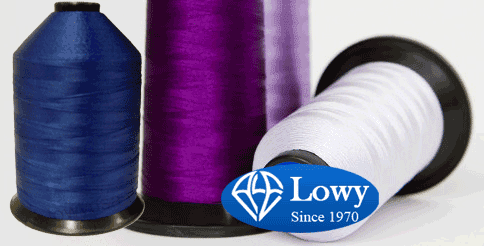Bonded nylon thread is a wonderful thread
to use widely in our daily lives. Developed
in the 1930's, bonded nylon is a very resilient thread. When compared to
other types of thread, nylon is appreciated because it is extremely strong and
flexible.
There are many advantages and disadvantages
of nylon thread. On the positive side, bonded nylon thread is coated with a
special resin which helps make the thread strong and durable. A
middleweight (Size 92) nylon thread has a tensile strength of about 15 pounds.
At that strength there are very few people who can break it just by pulling. Nylon
thread stretches about 26%. This means that 12 inches of nylon will stretch to
15 inches over time. This is usually good because it lets your seams adjust to
movement and changes in temperature. Additionally, nylon thread is lightweight,
smooth and does not absorb liquid, which is especially important for clothing
applications where underarm seams are prone to weakening because of perspiration.
There are some negative issues with nylon
thread, because it tends to get brittle and turn yellow over time. When used
for seams on clothing, this issue is likely not a problem because of the
overall short lifespan of clothing and the fact that seams are hidden on the
inside of a garment. Nylon thread melts when exposed to the high heat of a
clothing iron. To avoid fused seams, users should be sure to iron items with a
low-temperature iron and with the correct side out, rather than inside out.
Main Uses of Nylon Thread:
Luggage and travel goods
Soft Goods
Outdoor goods and sports equipment
Pet Collars & Leashes
Tie-downs
Cargo Straps & Slings
Harnesses
Leather sewing
Belts
Leather Wear
Furniture Upholstery
Footwear

No comments:
Post a Comment